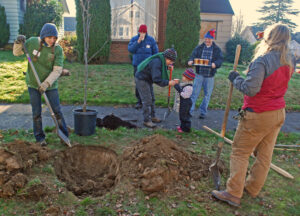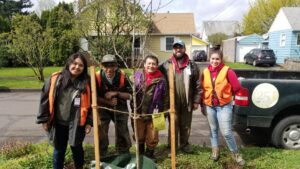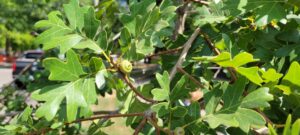Trees are part of the solution to climate chaos
A letter from executive director Yashar Vasef, with an update about community tree planting in Portland
Friends,
It’s official: We need trees more than ever. Heatwaves, flooding, and all of the increasingly catastrophic effects of climate change make it clear that every day needs to be the day for climate action. Friends of Trees has been planting trees in neighborhoods and natural areas for 32 years; we’re planting street and yard trees that will shade our streets and cool our homes, prioritizing low-canopy, underserved neighborhoods, and we’re also planting native trees and shrubs to help restore sensitive natural areas.
Since 1989 we’ve planted more than 870,000 trees and native shrubs, and we’ve done this through engaging tens of thousands of community members, and while implementing and growing programming that aims to do this work inclusively and equitably.
“At a time when climate change is making heat waves more frequent and more severe, trees are stationary superheroes.” (New York Times, 7/2/2021)
It’s not enough. We are experiencing climate chaos, and trees are increasingly promoted as a major solution, which is why you may have seen Friends of Trees in the news recently. Some of that news focused on our 13 year partnership with the City of Portland Bureau of Environmental Services.
It seemed until recently that funding for our work planting and caring for street and yard trees in Portland was ending, and our concern was that with our funding ending, and without funding being awarded to anyone for community tree planting, this critical work would be suspended for an unknown amount of time. And given climate change’s growing severity, we simply cannot afford to even temporarily pause community tree planting.
It is widely acknowledged that planting trees is a key part of a comprehensive climate strategy. It is our experience at Friends of Trees that planting trees with community members is also key to fighting climate change.
Planting and caring for trees increases community members’ engagement with the environment and overall participation in civic life, including engaging around climate action. There is a ripple effect from volunteering to plant trees that also fights climate change, beyond the actual trees. We expect to have quantitative data supporting this from the research we are conducting through our community grant from the Robert Wood Johnson Foundation, look for an update this winter.

We have since learned that we will receive gap funding to partially continue our Portland tree planting and care efforts through spring 2022, and our deepest thanks go to BES, and also to Commissioner Mingus Mapps’ office, which played a critical role in this positive development. However, there are some significant changes that if implemented would drastically change community tree planting in the City of Portland. As details firm up we will continue to keep you updated.
This particular contract is so important because so much of it has funded planting street trees. Trees play an invaluable role in combating heat islands brought on by climate change, and street trees especially so. Streets and concrete sidewalks absorb and retain heat, and release it at night; street trees help fight this effect and are crucial to cooling neighborhoods.
By now most of us are aware of the inequities with Portland’s tree canopy, one result of which is more heat islands in low-canopy/low-income/under-served neighborhoods. Friends of Trees prioritizes these neighborhoods and will continue to advocate for partnerships and practices that plant trees where they are needed most.
Looking past this upcoming season, BES has said they will issue a new RFP (Request For Proposals) for this sort of work–community tree planting and tree care–sometime this fall/winter, and our understanding is that, while they acknowledge the success of our partnership, they would like to engage other, diverse community partners. And to that we say, Yes!
We fully support BES taking on a new approach to their contracts in a way that prioritizes smaller and BIPOC organizations. It is our belief that uplifting such organizations in this work will make our mission stronger and brings all of us closer to climate justice by introducing voices at the table which were previously shut out. This is why Friends of Trees, during the evolution of our 13 year partnership with BES, has entered into partnerships in this work with organizations such as APANO, Blueprint Foundation, POIC, Verde, Wisdom of the Elders, and others.

Yes, BES (and all other public and private funders) should absolutely fund more community organizations in the fight against climate change and toward climate justice, and we fully support an open RFP process. As more funders work to diversify their support of community organizations, we encourage an approach that increases the funding pie (as in, make a bigger pie as opposed to cutting smaller slices) so more partners can be included. The planet is literally on fire and NOW is the time to increase investments in climate change.
Now we really have some work to do. We are preparing for the next planting season, and we’re doing so with significantly decreased funding and options for our largest urban tree planting site, the City of Portland. In October, when we kick off our 33rd season of planting and caring for trees as a community, we’ll be coming to you to ask that you support this work like never before, since this will be a season like never before.
A global pandemic, climate change, social injustice and political strife present our community with unprecedented challenges and often devastating impacts. As we all work together to re-envision our future, a future that is green, healthy, equitable and inclusive, we must ask all our policy makers and leaders where do their values lie. And do their budgets address an urgent climate crisis unlike anything humanity has experienced? For the sake of our communities, our natural habitats, climate refugees, wildlife, and the pale blue dot we call home, together, let’s ensure they are up to the task.
All my best,

Yashar Vasef, Executive Director
Photo, top: Gambel oak tree

